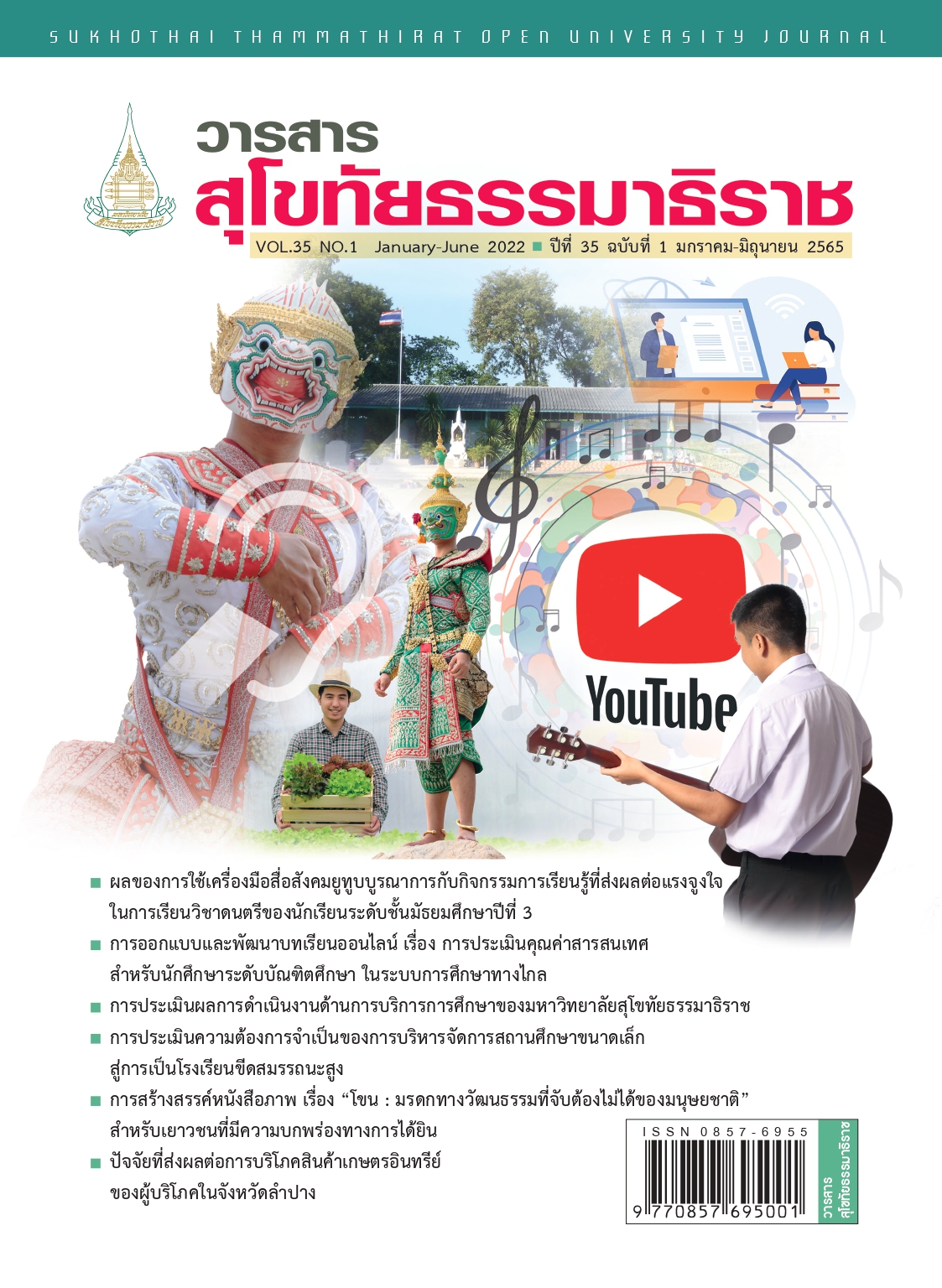ความต้องการและทัศนคติต่อสินค้าเกษตรอินทรีย์ของผู้บริโภคในจังหวัดลำปาง
คำสำคัญ:
ความต้องการ / การตัดสินใจซื้อสินค้าเกษตรอินทรีย์ /ทัศนคติ/ ผู้บริโภคบทคัดย่อ
งานวิจัยนี้มีวัตถุประสงค์เพื่อศึกษา1) ความรู้ ความเข้าใจเกี่ยวกับเกษตรอินทรีย์ 2) ทัศนคติต่อสินค้าเกษตรอินทรีย์ 3) ความต้องการสินค้าเกษตรอินทรีย์ 4) ความสัมพันธ์ของลักษณะทางประชากรของกับทัศนคติของผู้บริโภคที่มีต่อสินค้าเกษตรอินทรีย์ และ 5)ความสัมพันธ์ของทัศนคติต่อสินค้าเกษตรอินทรีย์กับความต้องการสินค้าเกษตรอินทรีย์ โดยใช้แบบสอบถามเป็นเครื่องมือในการสำรวจข้อมูลผู้บริโภคจำนวน 420 ตัวอย่าง ด้วยการสุ่มตามความสะดวกจากสถานที่สำคัญในอำเภอเมืองลำปาง วิเคราะห์ผลโดยสถิติ ร้อยละ ค่าเฉลี่ย ส่วนเบี่ยงเบนมาตรฐาน ค่าไคสแควร์ ค่าความแปรปรวนทางเดียว และค่าสัมประสิทธิ์สหสัมพันธ์แบบเพียร์สัน ผลการศึกษาพบว่าผู้บริโภคในจังหวัดลำปางกว่าร้อยละ 70 มีความรู้และความเข้าใจเกี่ยวกับเกษตรอินทรีย์เบื้องต้นเป็นอย่างดีและมีทัศนคติที่ดีต่อสินค้าเกษตรอินทรีย์ รวมทั้งมีความต้องการสินค้าเกษตรอินทรีย์ทุกประเภทโดยเฉพาะผักและผลไม้ อีกทั้งยังมีความเต็มใจจ่ายเพื่อซื้อสินค้าเกษตรอินทรีย์ในราคาที่สูงกว่าสินค้าปกติ อายุและรายได้มีความสัมพันธ์กับทัศนคติที่มีต่อสินค้าเกษตรอินทรีย์ในภาพรวม แต่ระดับการศึกษาไม่มีความสัมพันธ์กับทัศนคติของผู้บริโภค อีกทั้งยังพบว่าทัศนคติที่มีต่อสินค้าเกษตรอินทรีย์มีความสัมพันธ์กับความต้องการซื้อสินค้าเกษตรอินทรีย์อีกด้วย
เอกสารอ้างอิง
Deliana, Y. (2012). Market segmentation for organic products in Bandung West Java, Indonesia. Res. J. Recent Sci., 1(3), 48-56.
Greennet. (2019). Organic products sold in Thailand. Retrieved October 11, 2019, from Web site:https:// https://www.greennet.or.th/2002-global-oa/ (in Thai)
Jingchit, R. (2018). The future of Thai of Thai organic farmer: Dawn or Fall . Retrieved September 13, 2018, from Web site: http://www.tpso.moc.go.th/sites/default/files/1017-img.pdf (in Thai)
Johns, G. (1996). Organizational behavior: Understanding and managing live at work (4th Ed.). Moutreal: Harper Collins College Pub.
Kongsom, W. & Kongsom, C. (2016). Consumer behavior and knowledge on organic products in Thailand. International Journal of Economics and Management Enineering, 10(8), 2602-2606.
Mitchell C.O., Rebecca J. S., & Chandukala, S. R. (2014). Green Claims and Message Frames: How Green New Products Change Brand Attitude. Journal of Marketing: September 2014, 78(5), , 119-137.
Panyakun, V. & Kongsom, C. (2015). Study and preparation of situation, production and marketing of organic products. Bangkok: Ministry of Commerce. (In Thai)
Paul, J., A. Modi and J. Patel (2016). Predicting green product consumption using theory of planned behavior and reasoned action.Journal of Retailing and Consumer Services, 29, 123-134.
Pino, G., Peluso, A. M., & Guido, G. (2012). Determinants of Regular and Occasional Consumers' Intentions to Buy Organic Food. Journal of Consumer Affairs, 46(1), 157-169.
Rana, J., & Paul, J. (2017). Consumer behavior and purchase intention for organic food: A review and research agenda. Journal of Retailing and Consumer Services, 38, 157-165.
Rizwanalam, M. (2013). Branding Through Green Marketing: A Qualitative Appraoch. International. Journal of Sales & Marketing Management Research and Development (IJSMMRD) 3(1), 13- 20
Sukkarat, K. (2018). Study of attitude, behavior, and involved factos of organic product consumers (Master of Science’s Thesis). Thammasast University, Bangkok. (In Thai)
Van Loo, E. J., Diem, M. N. H., Pieniak, Z., & Verbeke, W. (2013). Consumer attitudes, knowledge, and consumption of organic yogurt. Journal of Dairy Science, 96(4), 2118-2129.
ดาวน์โหลด
เผยแพร่แล้ว
เวอร์ชัน
- 2023-05-26 (2)
- 2022-11-01 (1)
รูปแบบการอ้างอิง
ฉบับ
ประเภทบทความ
สัญญาอนุญาต
ลิขสิทธิ์ (c) 2022 มหาวิทยาลัยสุโขทัยธรรมาธิราช

อนุญาตภายใต้เงื่อนไข Creative Commons Attribution-NonCommercial-NoDerivatives 4.0 International License.
บทความที่ได้รับการตีพิมพ์เป็นลิขสิทธิ์ของวารสารมหาวิทยาลัยสุโขทัยธรรมาธิราช
ข้อความที่ปรากฏในบทความแต่ละเรื่องในวารสารวิชาการเล่มนี้เป็นความคิดเห็นส่วนตัวของผู้เขียนแต่ละท่านไม่เกี่ยวข้องกับมหาวิทยาลัยสุโขทัยธรรมาธิราช และคณาจารย์ท่านอื่นๆในมหาวิทยาลัยฯ แต่อย่างใด ความรับผิดชอบองค์ประกอบทั้งหมดของบทความแต่ละเรื่องเป็นของผู้เขียนแต่ละท่าน หากมีความผิดพลาดใดๆ ผู้เขียนแต่ละท่านจะรับผิดชอบบทความของตนเองแต่ผู้เดียว
ห้ามนำข้อความทั้งหมด หรือบางส่วนไปพิมพ์ซ้ำ เว้นแต่จะได้รับอนุญาตจากกองบรรณาธิการวารสาร


